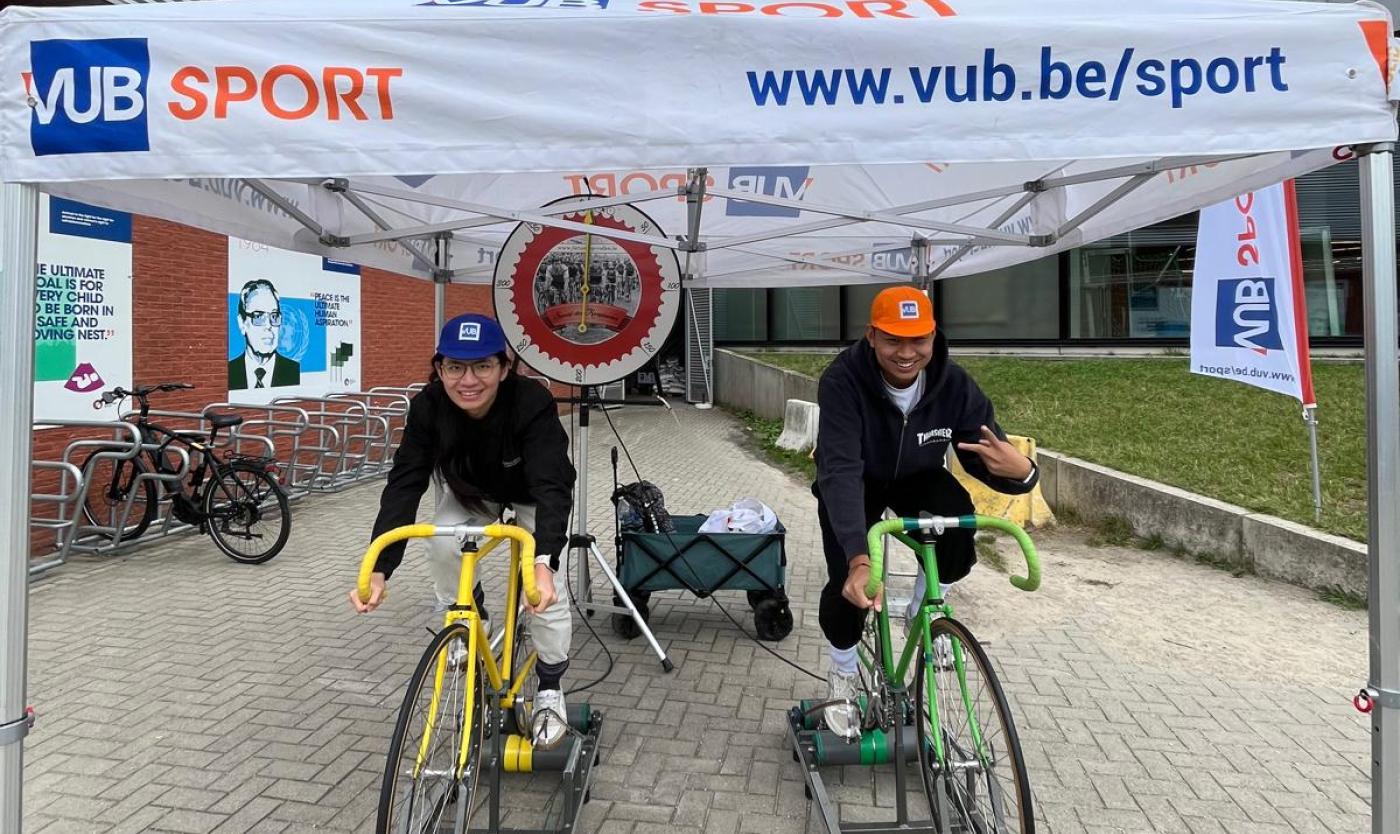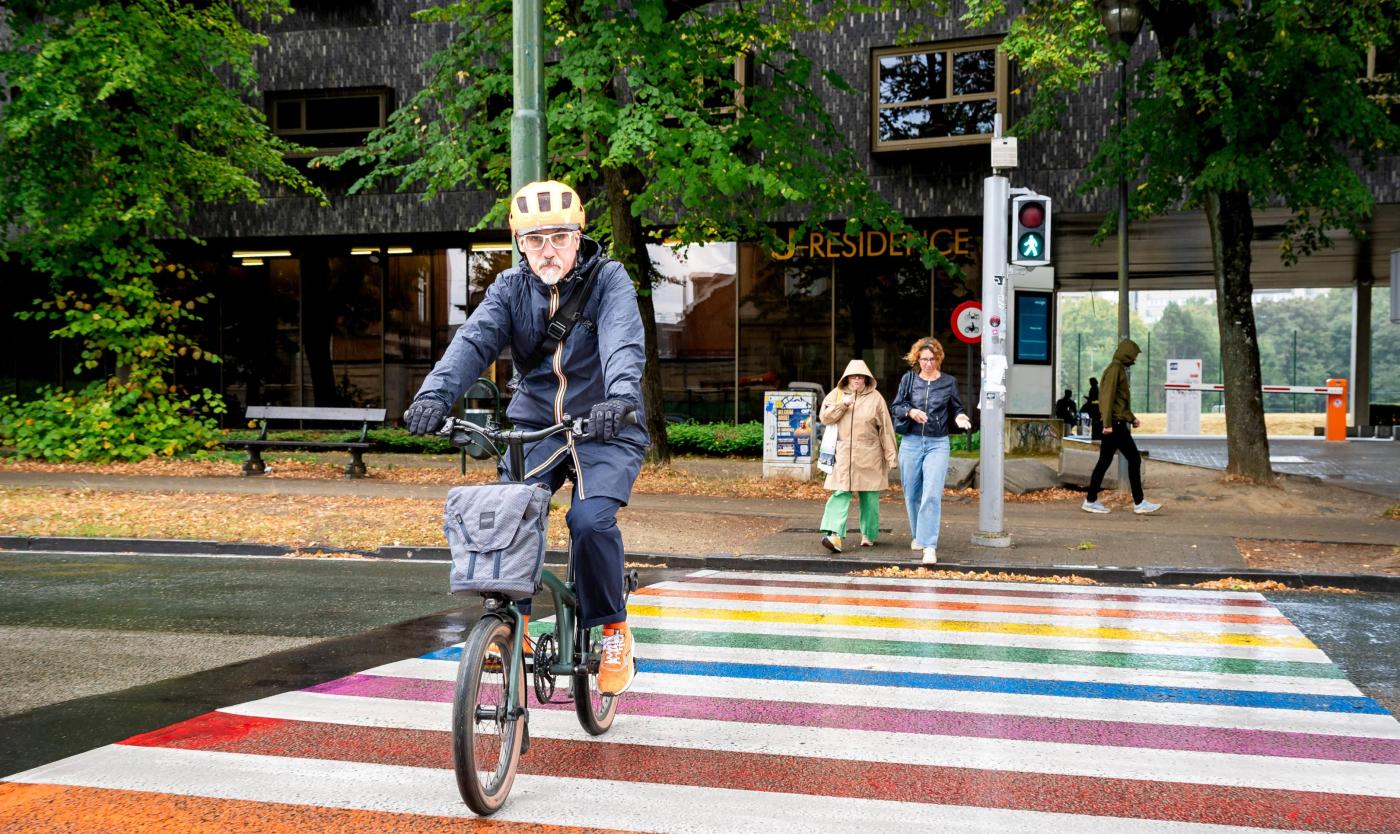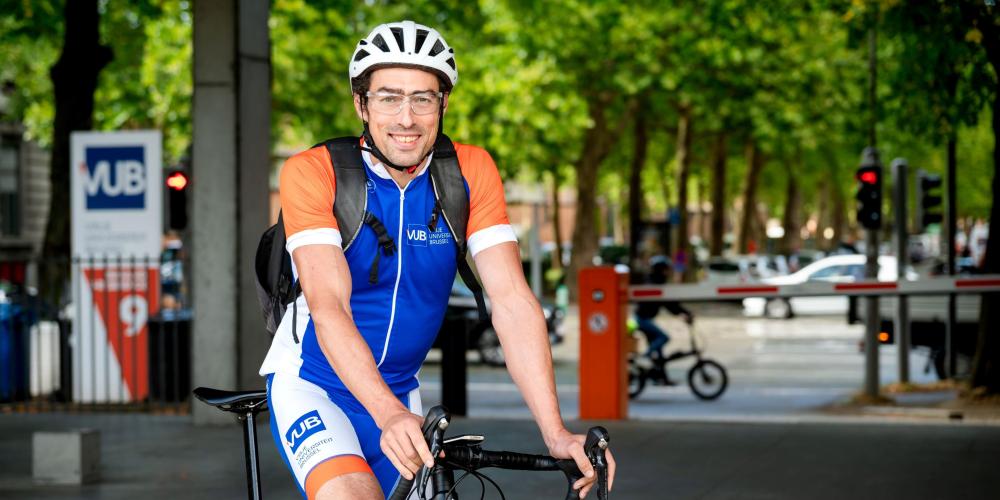
From 1 to 31 October, Vrije Universiteit Brussel (VUB) will take part in the Academic Bicycle Challenge, or ABC for short. The goal? To challenge all VUB members – students and staff alike – to cycle as many kilometres as possible. And with good reason: cycling is the ideal lever for both health and sustainability. VUB exercise scientist Dirk Aerenhouts puts it simply: “Every trip by bike is a gain.”
What makes cycling such a smart choice?
“The benefits of cycling go far beyond a bike allowance. It improves your health, makes you fitter, and saves time. If you cycle to work, you’ve already done your workout. Cycling is unique in the way your muscles work: unlike jogging, they don’t need to brake with every step, which means less muscle soreness. Your ankles and knees also take fewer shocks. That makes cycling accessible, even for people with knee problems or those less built for running.”
“Cycling is also a powerful choice for the climate. You help cut greenhouse gas emissions and reduce traffic congestion. Fewer cars on the road means fewer raw materials, less need for parking space, and lower healthcare costs. With the resources this frees up, we can invest in better cycle paths, more green spaces, and – who knows – even lower taxes. Nothing but advantages, except for the car industry. As a university, we can encourage cycling further with secure bike parking, bike leasing, and by sharing our research on successful cycling interventions more widely with policymakers and the public. That way, we can take even bigger steps forward.”
What physical and mental benefits does it bring?
“Every active journey brings health benefits. Cycling helps you manage your weight and lowers the risk of lifestyle-related diseases such as cardiovascular disease and diabetes. Regular exercise reduces the likelihood of stress, anxiety, and even depression, while improving concentration. In older adults, it helps slow cognitive decline. Studies even show positive effects in preventing Parkinson’s and Alzheimer’s. Exercise also improves your sleep, helping you feel more energised during the day. But beware: exercising right before bedtime puts your body into a state of heightened alertness, which can actually make it harder to drift off.”
“Regular movement reduces the risk of stress, anxiety, and even depression, while boosting concentration.”
How hard do I need to cycle to feel the effects?
“The greater the effort, the greater the training effect. A fitness test can map out your heart rate zones, but often your breathing is the best indicator. If you can still talk and are hardly sweating, you’re in the moderate exercise zone, burning mostly fat. Once your breathing speeds up, you sweat more, and talking becomes difficult, you’ve entered the high-intensity zone. At that point you burn mainly glycogen (muscle sugars), though such intense exercise also triggers an afterburn effect: your body keeps burning fat for quite a while afterwards. Research shows that high-intensity training is more effective for fat loss. But if losing weight is your only motivation, you may quit quickly since progress isn’t dramatic. Better to focus on the joy of cycling, the time you save, and the health benefits.”
“You’ll also notice fitness gains quickly. The biggest progress comes at the start: going from 0 to 15 minutes of daily activity brings more benefit than going from 100 to 115 minutes. Cycling mainly trains your leg muscles – your glutes, thighs, hamstrings, and calves (if you push off with the ball of your foot). With clipless pedals, you engage your hamstrings (back of the thigh) and hip flexors even more. Your core and arm muscles are hardly used, so it’s best to train them separately.”
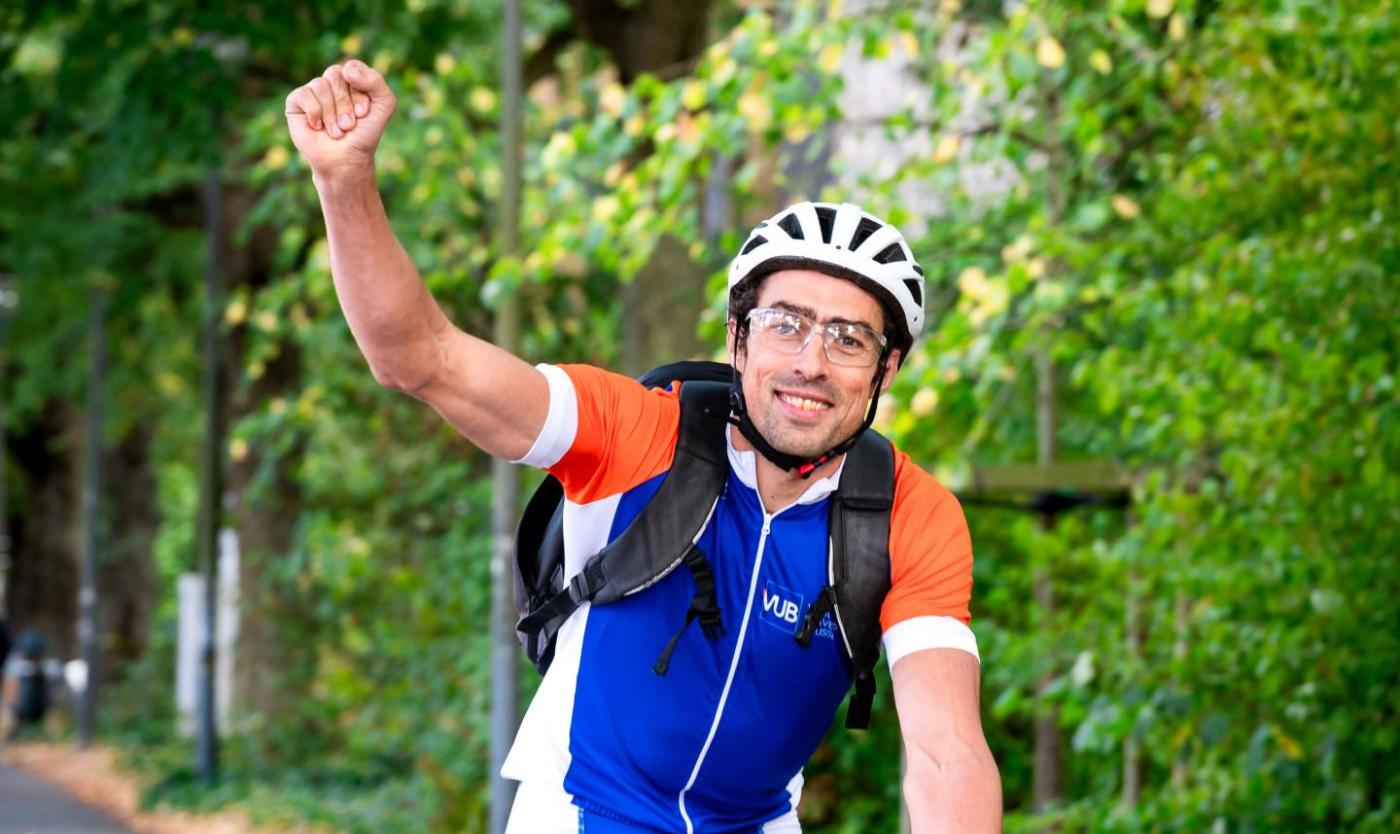
“Want to make the most of short bike rides? Then cycle as intensively as possible. A short, powerful effort triggers a stronger muscle response and a greater training effect.”
Is cycling in the city actually healthy?
“The air quality in cities isn’t necessarily worse than in the countryside. Rural areas also have plenty of fine particles in the air, caused by traffic and agricultural activity. A lot depends on wind direction, temperature, and wind strength. The situation in cities like Brussels has improved significantly in recent years. Ghent, Amsterdam, and Copenhagen are doing even better. My tip? Try not to cycle directly behind cars. If possible, ride through green areas. But even if your route takes you along busy roads, the overall balance remains positive.”
Do e-bikes offer the same benefits?
“An electric bike requires less effort, so the health benefits are lower than with a regular bike. Ecologically, too, a classic bike scores better. But an e-bike is still far better than using a car. And if your e-bike helps you cycle more often and over longer distances, it does improve your health. An e-bike can also lower barriers: you arrive less sweaty and faster, and it makes it easier to stay active – even for people with joint problems, low fitness levels, older adults, or those on medication such as beta blockers (which prevent the heart rate from rising much). The most important thing is simply not to remain sedentary.”
What’s a good cycling posture?
“Find a balance between sporty and ergonomic. A sporty, forward-leaning position is more aerodynamic, but it puts more strain on your neck, lower back, and pelvis. A more upright posture supports your natural back alignment and is more comfortable.”
“The position of your handlebars and saddle also affects your posture. When sitting on the saddle with your heel on the lowest pedal, your leg should be just straight. A saddle that’s too low makes pedalling harder and tires your muscles more quickly. A saddle that’s too high makes you slide around and can cause friction discomfort.”
What helps against saddle pain?
“Unfortunately, there’s no universal ‘perfect’ saddle. A soft saddle isn’t necessarily better either. First, try adjusting the saddle position to relieve pressure. If that doesn’t help enough, get advice at a bike shop. Don’t just grit your teeth and endure it, because that can lead to lasting issues. Cycling shorts with padding also help reduce friction and pressure.”
“An e-bike is still better than the car. If it helps you cycle more often and over longer distances, it will improve your health.”
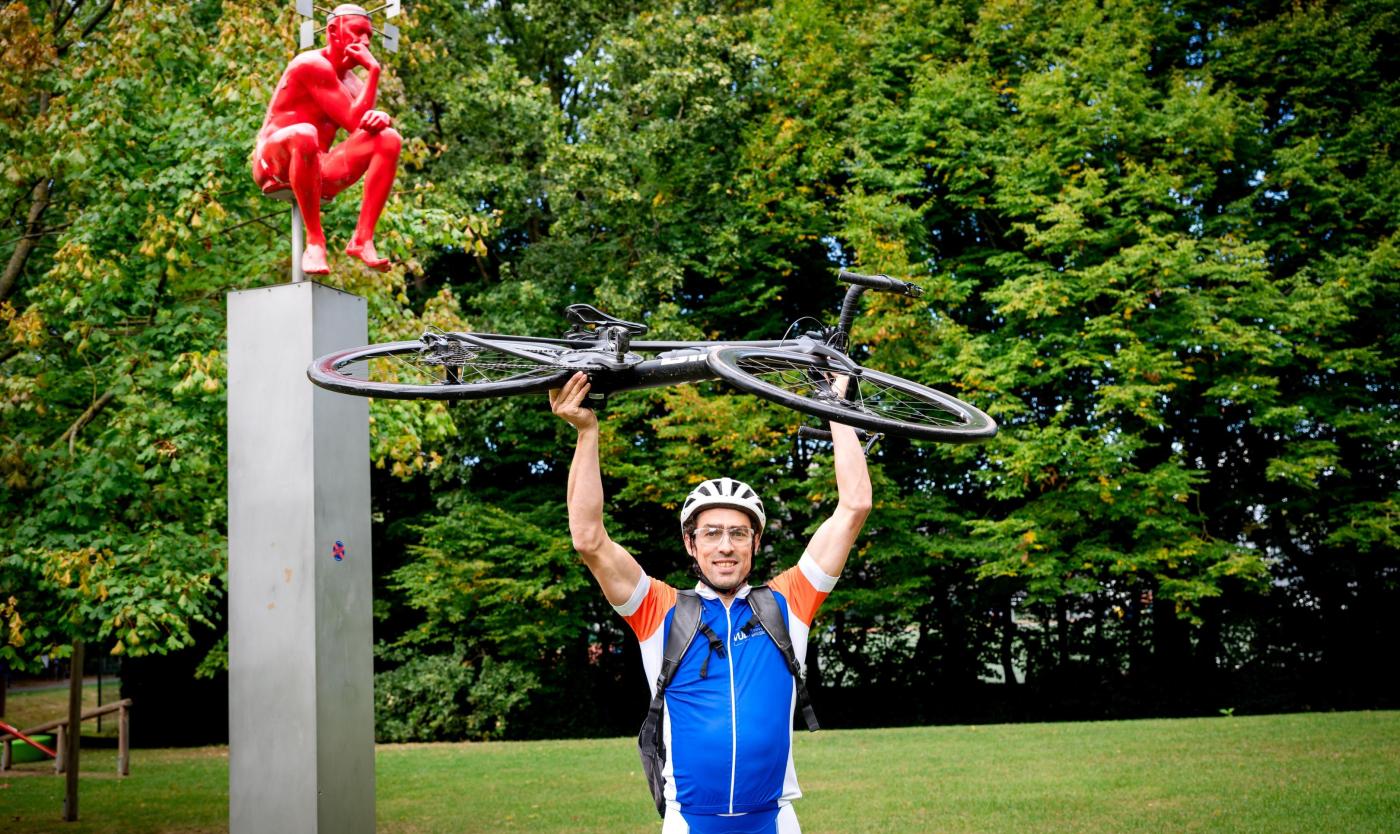
What cycling mistakes do you often see?
“Besides a poorly adjusted saddle or handlebars, I often see cyclists riding with a worn chain. A creaking or squeaking chain is a clear sign it needs maintenance. Cycled in the rain? Store your bike indoors so the chain can dry. Always rinse off a dirty chain and re-lubricate it. Also check your tyre pressure regularly and make sure your bike fits you. With a frame that’s too large, you’ll be stretching too far forward and problems are inevitable. Get proper advice and always take a test ride – especially with a second-hand bike.”
Are sports drinks useful?
“Sports drinks and gels don’t belong in a healthy diet. They contain a lot of sugars that, if not used straight away, are stored as fat. They create huge sugar spikes – raising the risk of type 2 diabetes – and damage your tooth enamel. They only make sense during or immediately after intensive exercise (lasting over an hour), to provide extra energy or replenish sugar levels. Hydration, however, is important, especially in hot weather. Sweating heavily makes you lose fluids and electrolytes. Drinking enough water and eating healthy food is enough to restore them. Only on a long ride lasting several hours can an electrolyte drink be useful.”
“Sports drinks and gels don’t belong in a healthy diet.”
What should I eat before getting on the bike?
“Don’t skip breakfast: a sugar crash on the way is no fun. Go for a healthy breakfast with fruit and wholegrain products. They release sugars more slowly and keep your blood sugar levels stable. It’s best to avoid refined carbohydrate sources such as white bread and cornflakes. Drink water, tea, or coffee – but not fruit juice, which contains as much sugar as soft drinks. And the typical English breakfast with sausages, bacon, and eggs? Not a good idea. Processed meats are unhealthy, and such a heavy meal sits in your stomach – not ideal when exercising.”
5 Tips to Cycle More
Build up gradually
Increase your distance and intensity slowly to avoid injuries.
Don’t rush yourself
Don’t be discouraged by social media full of top performances. Focus on your own enjoyment and progress.
Find the balance
Alternate easy and intense rides. This way, you train in a varied way and stay motivated.
Don’t be too strict
Every kilometre counts, but nothing is compulsory.
Cycle safely
Follow the highway code and, preferably, wear a helmet.
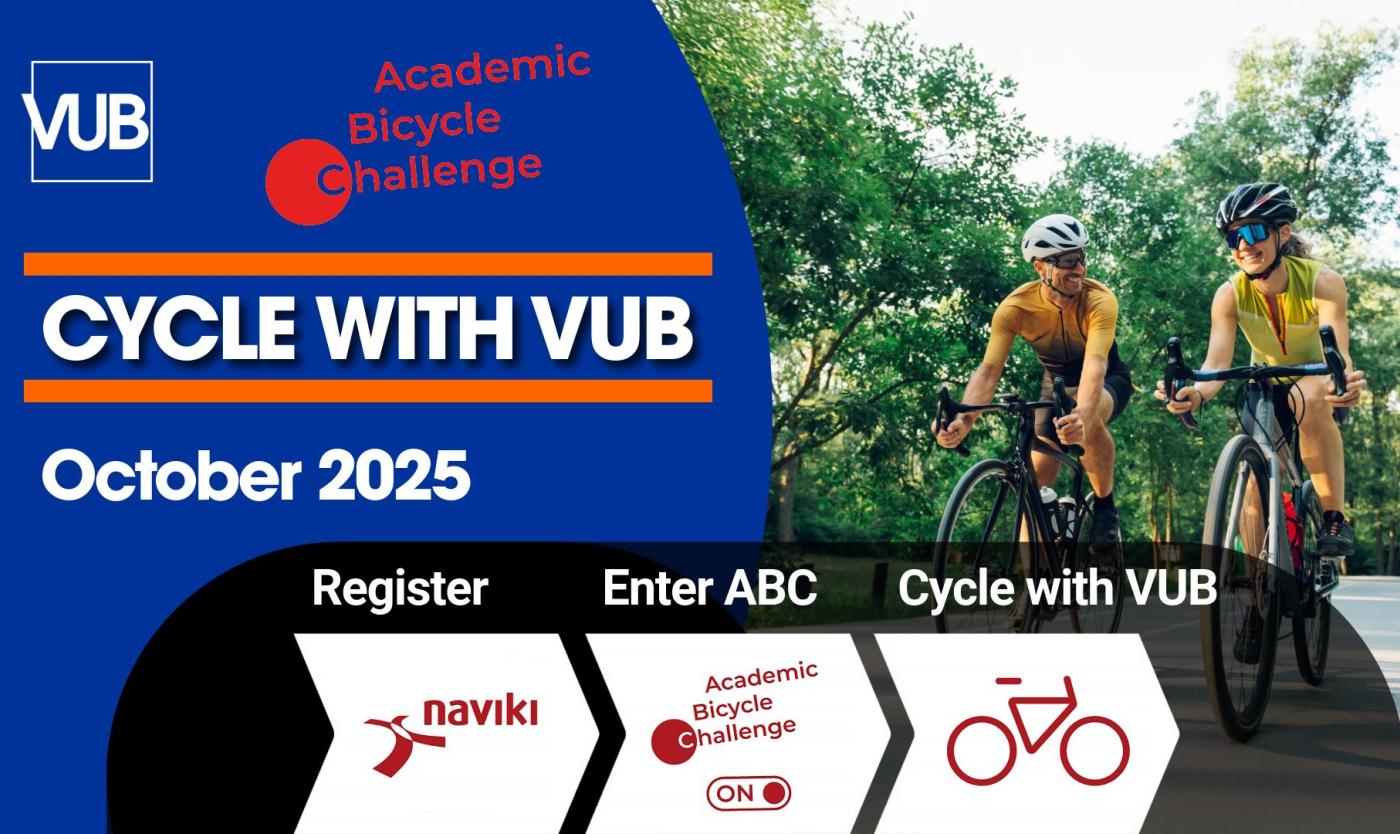
The ABC Bike Challenge: How to Take Part
The challenge starts on 1 October, but you can register now. How does it work? Simple!
- Download the free Naviki app.
- Select ABC, indicate VUB as your institution, and then choose your faculty or department.
- Hop on your bike and record the kilometres you cycle.
Everyone at VUB (including UZ staff) can take part. And yes, kilometres on your e-bike count too!
